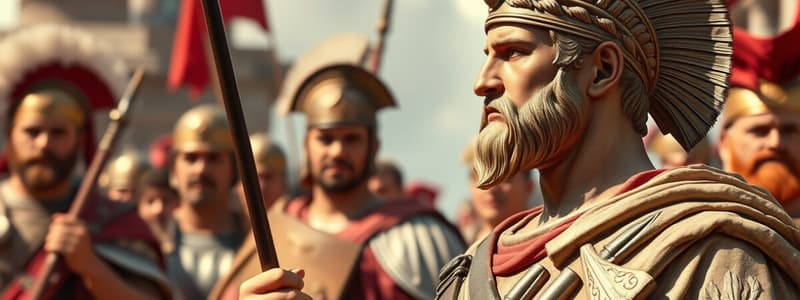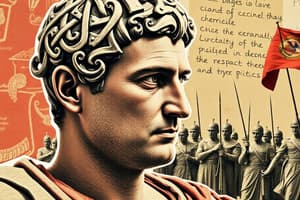Podcast
Questions and Answers
What was one of Julius Caesar's main concerns during his rise to power?
What was one of Julius Caesar's main concerns during his rise to power?
- Caring for his soldiers (correct)
- Strengthening the Senate's power
- Building alliances with Pompey
- Gaining wealth for himself
What significant action did Julius Caesar take that marked his decision to confront the Senate?
What significant action did Julius Caesar take that marked his decision to confront the Senate?
- He organized a military coup
- He crossed the Rubicon River (correct)
- He dismissed his army
- He gathered more wealth
How long did the conflict between Caesar's Army and Pompey's Army last?
How long did the conflict between Caesar's Army and Pompey's Army last?
- 3 years (correct)
- 1 year
- 5 years
- 2 years
What title did Julius Caesar declare for himself after winning the civil war?
What title did Julius Caesar declare for himself after winning the civil war?
What was the status of the Senate after Caesar took control of the Roman government?
What was the status of the Senate after Caesar took control of the Roman government?
What did Caesar believe about the democratic form of government?
What did Caesar believe about the democratic form of government?
Which of the following was NOT an achievement of Caesar during his dictatorship?
Which of the following was NOT an achievement of Caesar during his dictatorship?
Why did the people of Rome remain loyal to Caesar?
Why did the people of Rome remain loyal to Caesar?
What significant social reform did Caesar implement?
What significant social reform did Caesar implement?
What amenities did Caesar provide that allowed all Romans to enjoy?
What amenities did Caesar provide that allowed all Romans to enjoy?
Flashcards are hidden until you start studying
Study Notes
Julius Caesar's Military and Political Rise
- Julius Caesar emerged as a military hero, leading the Roman army in Gaul (modern-day France) for nine years.
- Known for his generosity, Caesar took care of his soldiers, fostering deep loyalty and trust.
- During a period of political instability in Rome, senators battled for power, leveraging military support to gain control.
- Caesar's military successes elevated his reputation, causing concern for rival general Pompey and the Senate, leading to their fear of Caesar's growing influence.
Tensions with the Roman Senate
- The Senate declared Caesar an enemy of Rome and demanded his return without troops, aware that he would be powerless without them.
- Caesar faced a critical decision: return to Rome risking death or cross the Rubicon River with his army, violating Roman law.
- Choosing to cross the Rubicon, Caesar became a traitor under Roman law, marking a point of no return.
Civil War and Dictatorship
- Caesar's army engaged Pompey's forces in a civil war lasting three years, ultimately leading to Caesar's victory in 49 BCE.
- He declared himself dictator for life, holding absolute power in a system traditionally designed for temporary rule during emergencies.
- Although the Senate remained, it was filled with Caesar's supporters and lacked real power, symbolizing the end of the Roman Republic.
Reforms and Accomplishments
- Caesar implemented several reforms aimed at stabilizing Rome, including lowering taxes to alleviate burdens on the poor.
- He established new colonies providing land for farming and work on public building projects, enhancing local economies.
- Extended citizenship to more people in conquered lands, promoting inclusion and loyalty among diverse populations.
- Opened access to his private gardens for all Romans, showcasing a commitment to the common good, earning widespread public support.
Studying That Suits You
Use AI to generate personalized quizzes and flashcards to suit your learning preferences.




